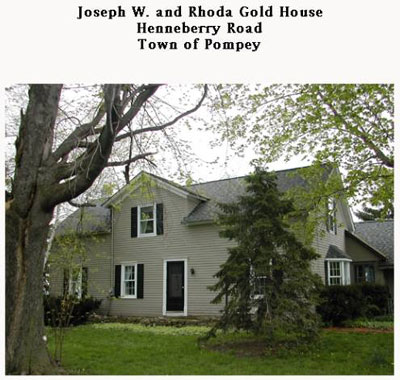
Joseph W. and Rhoda Gold House
Henneberry Road
Town of Pompey
c. 1810
The Joseph W. and Rhoda Gold House represents those European Americans who came to Onondaga County as slave owners, as well as those African Americans who came to Onondaga County enslaved in the households of European Americans.
On May 23, 1800, Joseph W. Gold, from Litchfield, Connecticut, acquired 600 acres in Lot 19 in the Town of Pompey from John Ransier, who had originally received this land for his service in the Revolutionary War. Joseph Gold moved his family to Pompey sometime between 1800 and 1810.
The 1810 census recorded that Joseph Gold had one enslaved person in his household. On March 3, 1811, that person, named Prince, was baptized in the Christ Church (Episcopal) in Manlius, sponsored by Joseph and Rhoda Gold. Joseph Gold died in 1818, aged 49. Apparently, Prince no longer lived with the family, because the 1820 census listed no black males in the household.
From the Gold family, the house passed to the Murrays and then to the Reeds.
Originally a one-story central chimney house, approximately 35 feet x. 20 feet, he Gold house still stands on Henneberry Road, in the middle of rich farmland, next to a barn. It is relatively unchanged from its original appearance, although a central dormer appears to have been added. Post-and-beam construction, Suffolk latches, HL and strap hinges, a plank door, pine wainscoting an original molding still remain inside the house.
“Joseph W. Gold House.” Pompey Historical Society, 2001.Research by Sylvia
Shoebridge, Pompey Town Historian. Drawings by Joel Cheely, V.I.P.
Structures. Thanks to Sylvia Shoebridge for all her work on this site.
Further archival research, especially in assessments might help date changes to this house. Church records, newspapers, and censuses might help reveal more of the story of the families who lived here.
